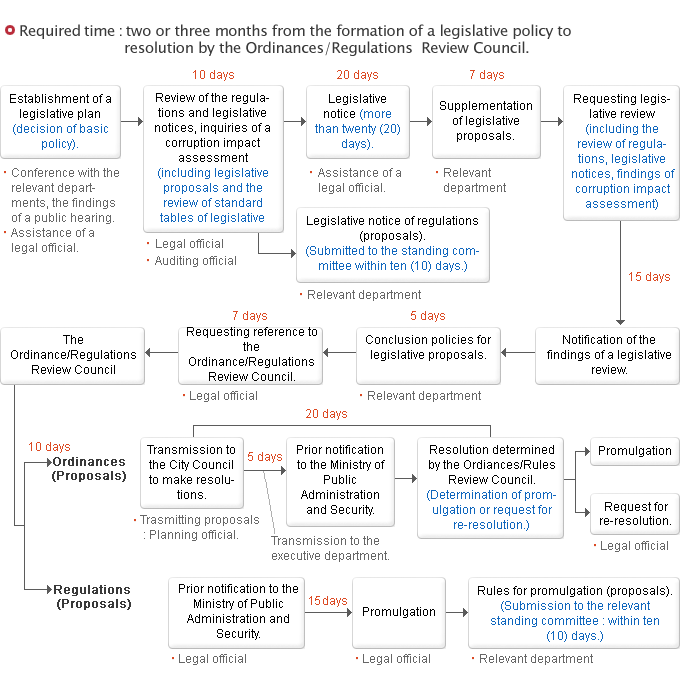- 『Local Self-Government Laws』 mean the ‘ordinances’ made by a local self-government body through a resolution of a local council with respect to its duties within the scope of laws and regulations, and the ‘regulations’ made by a chair of a local self-government body with respect to its duties that fall under its authorities within the scope assigned by laws and regulations or ordinances. The legislation processes of local self-governmental laws and regulations may be largely divided into the following five stages: 1. Basic policy for legislative directions; 2. Collection of citizen opinion, such as a public hearing, a legislative notice; 3. Confirmation of the preparation of legislative proposals (review and conclusion by the Ordinances/Regulations Review Council); 4. Resolution of council (only in the case of ordinances); and 5. Promulgation.
- 1. Basic policy for legislative directions
- The basic policy for legislative directions is to be established by specifying the necessity of making ordinances or regulations, including the realization of current policies and the assignation of duties as designated by ordinances under higher laws and regulations.
- 2. Collection of opinions
- In order to secure the transparency of legislation, citizen opinion will be sought and collected through, for example, a public hearing or legislative notice. The legislative notice process may be considered a verification process for policies that enhances the transparency of the legislation process by inviting the participation of citizens, reviews the problems posed by legislative content, and ensures the effectiveness of laws and regulations. The notice period should be more than twenty (20) days, unless there are special circumstances.
- 3. Preparation of legislative proposals
- Upon completion of a legislative notice, a legislative proposal is prepared and referred to the Ordinances/Regulations Review Council for review and resolution.
- 4. Resolution of assembly (only in the case of ordinances)
- The head of a local self-governmental body submits to a local council the ordinance proposals that have been resolved by the Ordinances/Regulations Review Council. These are then reviewed and resolved in a plenary session by passing through the standing committee under the Council.
- 5. Promulgation or request for re-resolution
- The head of a local self-governmental body publishes to the bulletin and promulgates the ordinance or promulgation proposals resolved and transmitted by a local council within twenty (20) days from the date when they are transmitted, after review and resolution of the Ordinances/Regulations Review Council. When there is an objection to the ordinance proposals, the head may refer it to a local council and request a re-resolution with a relevant reason for the objection.







